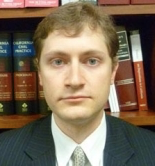Industry Insights
June 20, 2018
Grinberg: Filing Limit Doesn't Turn on 'Knowledge of Industrial Causation'
- State: California
- - 0 shares
Have you seen the Terry v. Department of Corrections decision (writ denied) originating at the Eureka board?

Gregory Grinberg
The Terry case is a sad but straightforward one. Terry sustained an admitted injury in May of 2011 to his spine. Unfortunately, he passed away in May of 2016, and his widow filed a death claim alleging that the admitted spine injury from 2011 contributed to his death.
The workers' compensation judge (and later the Workers' Compensation Appeals Board) found that the claim for death benefits was not compensable, relying on Labor Code section 5406 (“proceedings shall not be commenced more than one year after the date of death, nor more than 240 weeks from the date of injury.”)
In this case, the death was about 260 weeks from the date of injury.
Applicant cited the case of Arndt v. WCAB (1976) for the proposition that the 240 weeks should be calculated form the date of injury, the date when applicant knew her husband’s death was industrially caused.
The WCJ and WCAB rejected this theory, reasoning that the case at hand was a specific injury, so the compensable consequence, death, relates to the original date of injury, rather than the date on which the applicant became aware of the connection between the death and the original industrial injury from 2011.
This argument, trying to pin the date of injury for a specific injury to the date of knowledge of industrial causation (or the right to file a claim), is one we’ve seen before.
In the panel case of Ostini v. Alma Rosa Winery & Vineyard, applicant also argued that the statute of limitations should not bar her claim because she didn’t know the injury was industrial until a year after it happened. In that case, the panel reversed the WCJ in finding that the “date of knowledge” of industrial causation was irrelevant to a specific injury claim.
Death cases are always sad, but it is important that this result was reached to avoid making the defendant a victim of injustice.
Gregory Grinberg is workers' compensation defense attorney at the Law Office of Gregory Grinberg, based in the San Francisco Bay Area. This post is reprinted with permission from Grinberg's WCDefenseCA blog.
Advertisements
Columns
- Lang: Proposed LC 5710 Fees Guidelines 02/20/26
- Barthel: Even Super Bowl Winners May Lose in Comp 02/18/26
- CAAA: Misuse, Misrepresentation of Interpreter Credentials Grow in Comp 02/12/26
- Langham: On Self-Insurance 02/06/26
- Paduda: Catastrophic Claims Are Changing 02/04/26
- Bair: Leaning Into Liens 02/02/26
- Barthel: How Hard Can Intoxication Defense Be? 01/30/26
- Geaney: What Questions Should Permanency Evaluators Ask Petitioners? 01/28/26
- Paduda: Health Care Is Missing the Point 01/26/26
- Kamin: AI Citations Present Cautionary Tale for Attorneys 01/20/26
- Barthel: Is Rodriguez Worth It? 01/16/26
- Tolentino: Keep Your Friends Close, but Your Enemies Closer 01/14/26
- Young: The Top 2025 California Workers' Comp Developments 01/09/26
- Langham: Not Always an Accident 01/07/26
- Barthel: Is SIBTF a Great Idea Gone Awry? 01/05/26
- CAAA: New Comp Laws Take Effect in 2026 12/31/25
- Opalisky: The Ongoing War Over State's Statutory Employer Doctrine 12/30/25
- Kamin: Our Top 10 Blogs of 2025 12/26/25
- Barthel: Are You an Employer, or Do You Use Independent Contractors? Can You Prove It? 12/24/25
- Barthel: Is Pot a Defense? Are You High? 12/22/25
Now Trending
- Workers' Compensation News
-
Calif.
Single-Payer Proposal Returns to…
Posted on Feb 17, 2026
-
Calif. Exclusivity
Bars Tort Claims for Asbestos…
Posted on Feb 19, 2026
-
Calif. CWCI:
Nonfatal Work Injuries, Illnesses
Returned to Pre-Pandemic Levels in…
Posted on Feb 17, 2026
-
Ohio Worker Gets
No Benefits for Conveyor Belt
Accident Due to Marijuana…
Posted on Feb 17, 2026
-
Wis. Agreed-Upon
Reform Bill Heading to…
Posted on Feb 18, 2026
-
Fla. Court:
Employer Didn't Rebut Heart-Lung…
Posted on Feb 20, 2026
-
Pa. Split Supreme
Court Cites Triable Issues in
Worker's Tort…
Posted on Feb 23, 2026
-
Mich. BCBS Selling
Work Comp Subsidiary AG…
Posted on Feb 17, 2026
-
Ntl. NCCI Opens
Registration for AIS…
Posted on Feb 18, 2026
-
Ntl. Regulators
Warn of…
Posted on Feb 17, 2026
Jobs
Upcoming Events
Feb 26, 2026
Permanent Disability Rating Bo
This AWCP program provides focused education on California permanent disability in workers’ compen …
Mar 3-4, 2026
Save The Date! WCRI’s 2026 Ann
Registration will open up in the coming months. We'll see you there! - Leading national workers' …
Mar 5-6, 2026
DWC’s 33rd Annual Educational
Register Now! 2026 conference topics: DWC Update AI with a Claims Focus Medical and Legal Ethics …
Social Media Links
c/o Business Insurance Holdings, Inc.
Greenwich, CT 06836


No Comments
Log in to post a comment